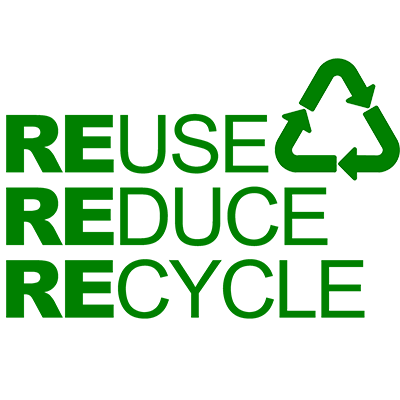
I think it’s safe to say that we’ve all heard about the three R’s of waste management; reduce, reuse, and recycle. But do you know why they are in that order and what each one entails? In order to fully understand the meanings of the three R’s we need to talk about the impact solid waste has on the earth annually. For example, did you know that each year, Americans throw away 50 billion food and drink cans, 27 billion glass bottles and jars, and 65 million plastic and metal jar and can covers [1]. So how can we cut back on these numbers? That’s where the three R’s come in to play.
Reduce
As you can likely deduce from its being the first of the three R’s, reducing is the best way to go about managing solid waste. It’s quite simple really, the less you use the less waste you will produce. This R causes the most unease in consumers because we tend to think we need to cut back on everything or we won’t be making an impact. This is not the case, though. By just doing a few things to cut back you can noticeably reduce your waste without totally altering your lifestyle. You could do this by:
- Buying products with less packaging. Did you know that 30% of the waste in our landfills comes from product packaging? When shopping for items choose the ones in just one bog or bag as opposed to those that are double and triple packaged.
- Buying products in bulk. By buying more of the same item all at once you reduce the overall amount of packaging you will encounter.
- Try to stay away from disposable goods. In particular, paper plates, cups, and plastic utensils.
- Buy durable goods. Especially when making a big purchase look into the history and reviews of the item you are buying. By buying something that will last you help to make sure wastes will stay out of landfills for longer.
Reuse
The second R is for reuse. This one is becoming more and more popular with the surge of upcycling and craft projects all over the web. If you reuse something as opposed to throwing it away you keep waste out of landfills and create something new. A quick internet search can open a world of ideas or you can try any of the following:
- Don’t automatically throw away items that are broken, several can be reused and turned into great new things!
- Use sealable containers rather than plastic wrap.
- Invest in some reusable shopping bags or bring old plastic ones with you to the store.
- Look into upcycling ideas for common household items, many have alternate uses you may never have thought about.
- Embrace hand-me-downs. As a younger sibling I can understand wanting clothes of your own but if you have kids of similar ages try to supplement wardrobes with some hand-me-downs as well. Another option is to shop second hand stores or consignment shops. That way the items will be totally new to you while still helping to reuse someone else’s potential waste.
Recycle
The final, and probably the best known, R stands for recycling. As you probably know, recycling is the process of remanufacturing a product to be sold as new. Along with the basics of paper, plastic, glass, and cardboard there are tons of items which can be recycled that you may not even realize. And remember, recycling only works if you complete the process by buying recycled materials. Start recycling today by doing any of the following:
- Check with your municipal garbage company to see if they have a recycling option as well. This can help make recycling even easier.
- Check with local recycling facilities to see what items they accept.
- Start an office recycling program.
More News From Heritage
-
2/21/25
Heritage Announces East Liverpool, Ohio 2025 Environmental Grant Program
Learn about our East Liverpool Ohio grant opportunity!
-
2/18/25
Heritage Environmental Services Announces James (Shelby) Marlow as Chief Financial Officer
Heritage Environmental Services announced today that James (Shelby) Marlow will join the organization as Chief Financial Officer.
-
1/31/25
January Community Engagement Initiative: Home/Work Energy Reduction
Learn about our January community engagement initiative
-
1/29/25
Heritage Environmental Services Announces Chris Ebeling as Chief Commercial Officer
Heritage Environmental Services announced today that Chris Ebeling will join the organization as Chief Commercial Officer.
-
1/28/25
Heritage Environmental Services Addresses Industry Challenges with New State-of-the-Art Shredder
Heritage Environmental Services announced a new state-of-the-art shredding unit.
-
1/7/25
Navigating e-Manifest: What You Need to Know About Hazardous Waste Compliance
Learn about the e-Manifest Third Rule changes that begin January 22, 2025
-
12/23/24
Wreaths Across America 2024
This year, through collective effort and heartfelt generosity, we sponsored 727 wreaths and transported two truckloads of wreaths across the country.
-
12/2/24
Heritage Environmental Services Announces Rachel Evans as Chief Human Resources Officer
Heritage Environmental Services announced today that Rachel Evans will join the organization as Chief Human Resources Officer.








